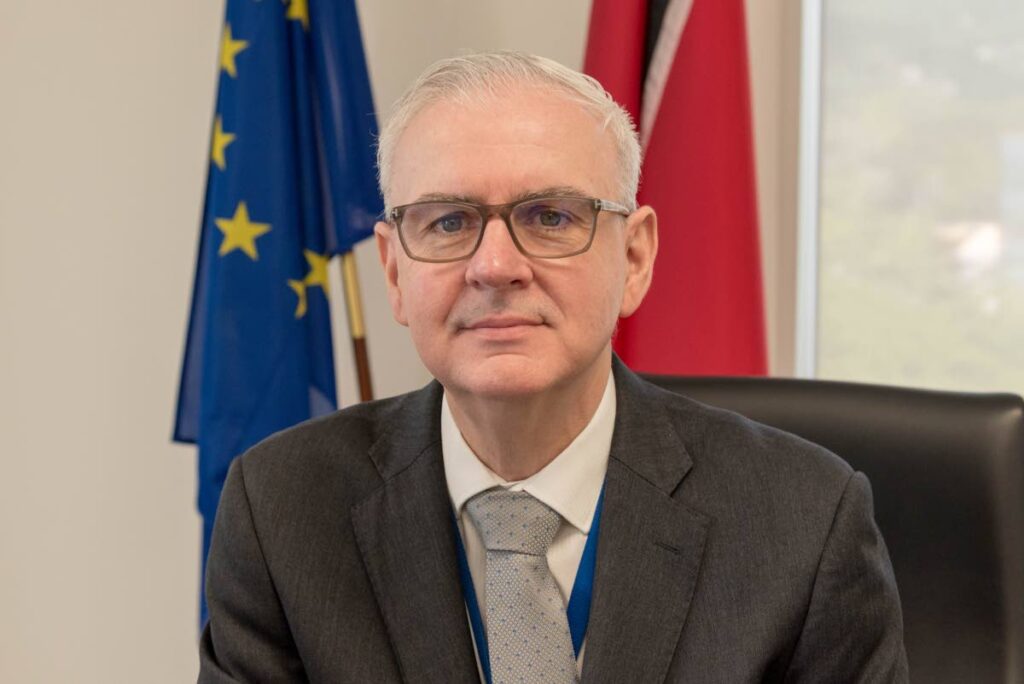Ending gender-based violence is everyone’s job
Written by reggietnt868radio on November 24, 2024

GENDER-BASED violence is the number one human rights abuse worldwide. In 2017, when the European Union (EU) invested approximately 500 million euros (US$530 million) and joined with the UN to initiate the global Spotlight Initiative, the world’s largest targeted and funded effort to end all forms of violence against women and girls, it was with a clear understanding that this issue needed a global effort.
This notion was reinforced by the former EU HRVP Federica Mogherini, who stated that, “violence against women is violence against the entire society – so the entire society must react to end it.”
Unique to the Spotlight Initiative was a whole-of-society approach that placed ending violence against women and girls at the heart of national development priorities and gave local communities the tools they needed to address violence in their specific context.
Since its launch, the Spotlight Initiative has been fully implemented in five regions around the world through 26 country programmes, six regional programmes and two UN Trust Fund programmes. Its success led to the initiative being selected as one of the 12 high impact initiatives for its impact across all of the sustainable development goals. Its comprehensive approach to ending violence against women and girls has led to more transformative, sustainable results and important lessons.
Despite some progress in countries around the world, however, violence against women and girls remains a serious and challenging issue. As such, the UN’s 2024 theme, UNiTE to End Violence against Women, is a rallying cry that we must all heed.
According to the UN’s global statistics, every 11 minutes a woman is killed. More disturbing is the fact that in some countries we are witnessing a growing backlash to gender equality and women’s rights – both of which can be precursors to rising violence.
Here in TT, this past October 2024 was a troubling month with homicides reported of four women who had previously experienced intimate partner violence.
Data from UN Women points to an even more troubling statistic – 44 per cent of TT women who have ever been in a relationship have suffered some form of violence be it physical, sexual, emotional and/or economic. In addition, Government data for just the first eight months of 2024, over 1,200 cases of domestic violence and 117 of sexual abuse were reported! Restraining orders continue to be violated with fewer than half of these offenders being prosecuted.

Peter Cavendish, Ambassador, European Union Delegation to Trinidad and Tobago –
The European Union is resolute in its stand for gender equality, and we uphold a zero-tolerance policy towards gender-based violence (GBV). We believe that GBV is not only a grave violation of human rights, but also it inflicts immeasurable suffering and harms economic progress and prosperity. We are committed to safeguarding the rights and dignity of all people, in collaboration with our partners around the world.
But, how can we achieve this? There are a number of steps we can take, including:
Prevention: Ending GBV must begin with prevention. Violence against women and girls and harmful practices are rooted in harmful social norms, beliefs, and attitudes. To address this, we need to continue supporting prevention strategies that promote equality and inclusion, including campaigns to end violence against women that transform these harmful norms, beliefs, and attitudes.
Breaking the Silence: Through open dialogue, we can break the stigma and taboo surrounding violence against women. The EU delegation has been working with our partners to encourage this much-needed dialogue – through our events and activities such as #LetsTalkTT – as well as through support to the initiatives of our partners in civil society organisations, GBV survivors and other stakeholders.
Tackling the root causes of violence and inequality: No problem can be solved without getting to the root causes and then addressing these on a societal, cultural and individual level. We must not forget the vulnerable and most affected in our midst, such as women and girls with disabilities, LGBTI, migrants and refugees and other minorities. Creating a safer environment for all women and girls must address and combat stereotypes, discrimination and sexism through education and awareness training, legal reforms and the creation of economic opportunities for the marginalised.
Monitor GBV online and offline: It is important to address the violence wherever it occurs and social media, as we all know, is a breeding ground for violence. There must be more vigilance and a firm commitment and strategy for dealing with perpetrators both on and offline.
Each one of us probably knows someone who has suffered some form of abuse or violence. It is up to all of us, therefore, to step up to support survivors and to eliminate this scourge. The EU has contributed US$4.5 million to TT’s Spotlight Programme and pledges to continue to collaborate with the TT government and all other partners to support their efforts in these and other areas, as outlined in the National Strategic Action Plan on Gender Based and Sexual Violence 2023-2027 (NSAP). TT is the first country since the launch of the Spotlight initiative to approve, at cabinet level, an NSAP.
Together, we can bring about change and create a safer, more equitable world for all.
Peter Cavendish is Ambassador, European Union Delegation to TT
The post Ending gender-based violence is everyone’s job appeared first on Trinidad and Tobago Newsday.




